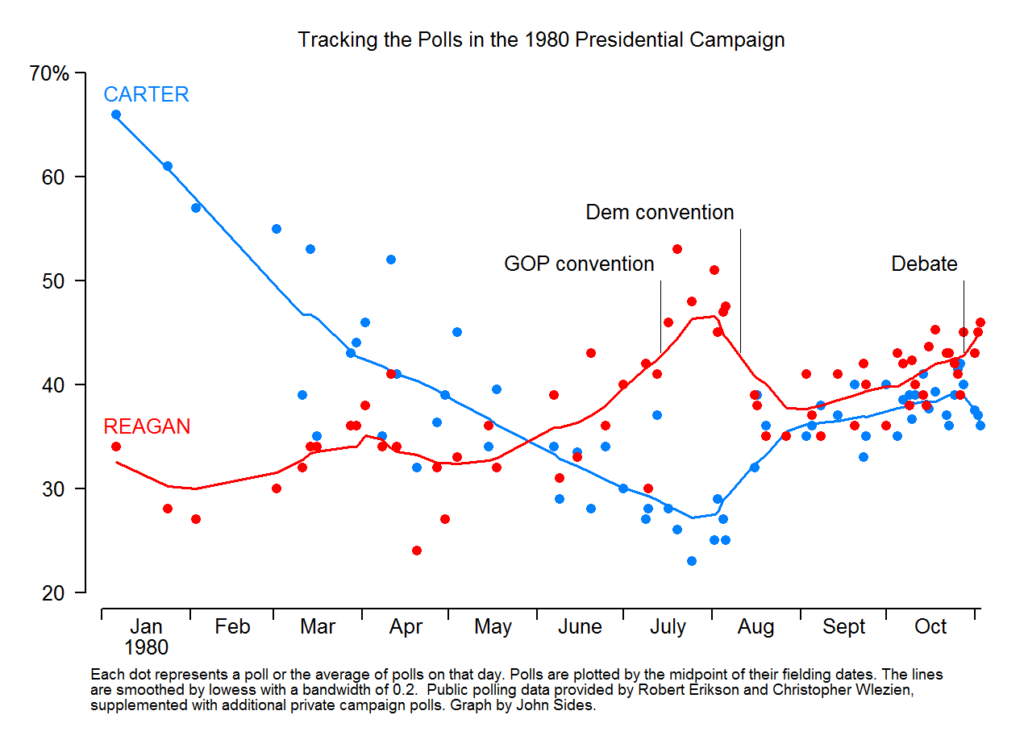Bryon York reports:
Romney aides believe strongly that this race will play out like the 1980 campaign, in which President Jimmy Carter led Ronald Reagan for much of the race until Reagan broke through just before the election.
As Jonathan Chait noted, 1980 is a poor comparison with 2012 for many reasons. One is simply that the economy is not as bad in 2012 as it was in 1980. Another is that Obama is much more popular than was Carter, whose job approval numbers were 15 points below Obama’s at this point in the campaign (see Gallup). Consider this: in August 1980, Carter’s approval rating among Democrats was about equal to Obama’s current rating among Americans as a whole. For more on the broader features of 1980 vs. 2012, see Matt Dickinson.
But there is another apparent misconception in the Romney campaign, which Nate Silver rightly picked up on in a tweet: Carter didn’t lead Reagan for much of the campaign. Below is a graph of all the polls, plus a smoothed trendline. The public polls were graciously provided by Robert Erikson and Christopher Wlezien, who use similar data from every election from 1952-2008 in their forthcoming book, The Timeline of Presidential Elections — which everyone should buy. I’ve supplemented their data with some late private polls conducted by the two campaigns, which are available in this paper by Warren Mitofsky.

The plot shows what Chait describes, which is the ebbing of Carter’s poll standing throughout 1980. Indeed, Reagan didn’t need his convention bump — which he certainly got — to put him in the lead. The Democratic convention helped erode Reagan’s lead but it never closed it altogether.
At the end of the campaign, Reagan did surge, but this only increased his lead. His surge appears to have been brought on first by the debate, and then perhaps by several other events in the final week of the campaign. To quote Mitofsky:
During that same final week, Richard Allen resigned from the Reagan campaign for an alleged misuse of influence during his Nixon White House days. The same day Carter’s congressional liaison, Frank Moore, resigned after repeating the unsubstantiated story of the Ayatollah’s cancer. On Friday of that week the final economic indicator of the campaign showed inflation still seriously on the rise. And on Sunday morning, November i, the Iranian parliament announced their conditions for freeing the American hostages. Jimmy Carter immediately abandoned campaigning and appeared on national television in the early evening to repeat much of what the public had been hearing all day. It was a week, in effect, with much that could affect the choices made by voters.
Carter’s pollster, Patrick Caddell, believed that Iran’s rebuff doomed Carter, saying “It was all related to the hostages and events overseas.”
The most interesting possibility here is not whether 2012 unfolds the way that Romney’s team thinks 1980 did, but whether it unfolds the way 1980 actually did. That is, with a tight race blown open by the Republican convention, giving Romney a lead that Obama can never fully overcome. This scenario is not currently the most likely, as the forecasts suggest, but neither is it implausible.



